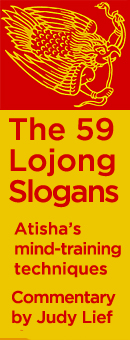The Mind-Training Slogans, Slogan #35

Each Friday, Acharya Judy Lief, teacher in the Shambhala tradition of Chogyam Trungpa Rinpoche, comments on one of Atisha’s 59 mind-training (Tib. lojong) slogans, which serve as the basis for a complete practice.
Atisha (980-1052 CE) was an Indian adept who brought to Tibet a systematized approach to bodhicitta (the desire to awaken for the sake of all sentient beings) and loving-kindness, through working with these slogans. Judy edited Chogyam Trungpa’s Training the Mind (Shambhala, 1993), which contains Trungpa Rinpoche’s commentaries on the lojong (“mind-training”) teachings.
Each entry includes a practice.
Read all the lojong slogans here.

35. Don’t try to be the fastest.
So much of our life is based on speed. We want to be the first to do this and the first to get that. We are always in a big rush. We want to beat everyone else, to get to the front of the line. Being fast and busy makes us feel important. We have lots to do and not much time to do it. Fast is smart, slow is stupid. Fast is youth, slow is old age. We race along faster and faster, but where are we going?
That quicker, faster, better approach creates enormous pressure. There is no relief, and it is hard to enjoy ourselves. We have no time to step back and reflect on what we are doing or what life is all about. Superficially this approach seems to make sense for a while, we have lots to do after all. But we become addicted to speed, and we are afraid to stop or even to slow down.
When we bring this approach into our spiritual journey and into mind training practice, it simply does not work. We may try to force feed knowledge into ourselves, but wisdom and compassion cannot be forced. Nor can creativity. Imagine if you judged something like a symphony in this way. One conductor could brag that their orchestra played Beethoven’s 9th in half the time!
Some people approach spiritual practice like gymnastics and think the more practices they do, and the quicker they progress through the various programs, levels, or what have you, the better. But the very term practice implies going at a steady speed. You keep doing the same thing repeatedly, over and over, no matter how advanced you may be If you are a singer you do scales, if you are a meditator you sit, if you are a hatha yogin, you do downward dogs.
Slogan practice is about cultivating both awareness and compassion, both in formal practice and in daily life. Ideally this is one complete package. You don’t try to get somewhere, but you just keep going. The less striving mind you have, the more inherent wakefulness shines through. The less you force it, the more the heart can relax and open. Instead of beating yourself up with the slogans, you use them as sharp but gentle reminders that awakening is immediate and available. Basically, you lighten up and give yourself a break from the relentless speed and pressure of modern life.
Today’s practice
Notice how the quality of speediness affects your practice and your daily life. Do you feel superior or special because you are faster than others and have passed them by? On the contrary, do you feel of inadequate that others are passing you by and leaving you in the dust? What would it be like to drop that success-failure paradigm altogether?
Home image: esbjorn2